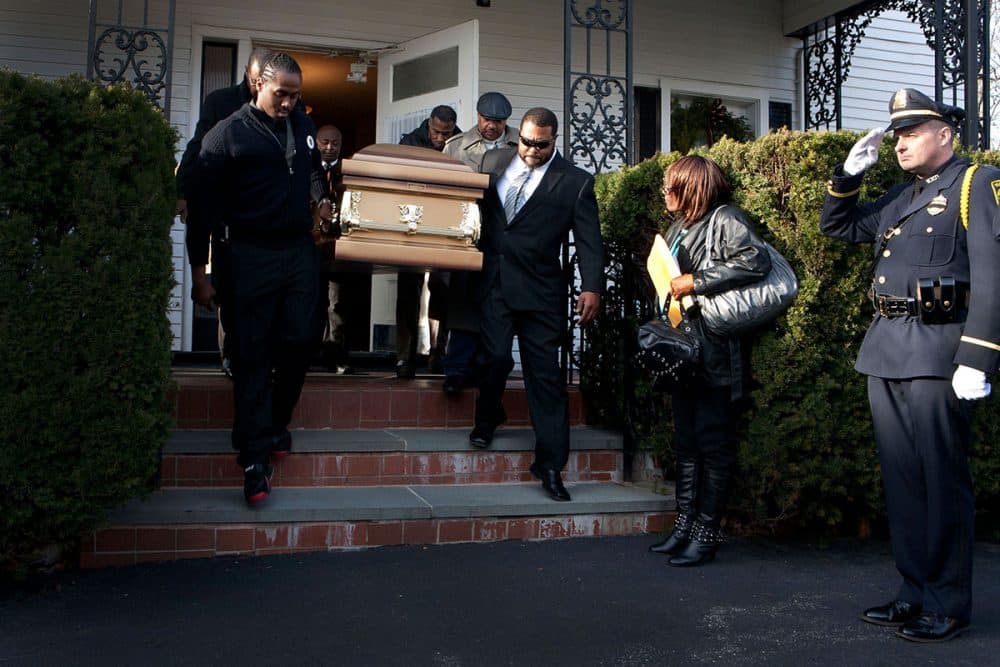Advertisement
Who Killed Gail Miles?: The Unsolved Murder Of A Retired Watertown Cop

Editor's Note: This report contains troubling details and offensive language.
In the early morning hours of April 19, 2013, a manhunt for Boston Marathon bombers Dzhokhar and Tamerlan Tsarnaev turned a quiet suburban backstreet in Watertown into a war zone. For the first time in the nation's history, bombs were used to attack police officers.
A year later, city police Chief Edward Deveau testified before Congress. “The handful of Watertown police officers on duty that night acted heroically and defended Watertown without regard to their own personal safety," he said. "They displayed courage and bravery as they stubbornly defended our community.”

For their heroic actions that night, five Watertown officers and two firefighters received the Public Safety Award for Valor, the nation's highest honor for public safety officers.
All of which makes the troubled life and unsolved murder of a former Watertown police officer, 61-year-old Gail Miles, so hard to reconcile.
A Horrific Scene
At 10:08 a.m. on Dec. 3, 2011, Boston police Officer José Diaz responded to a radio call for a well-being check at 8 Wardman Rd., in Roxbury.
The deadbolt was locked. There were no signs of forced entry. So Diaz broke through the rear door of Miles' second-floor apartment.
He found a horrific scene. "[The victim was] badly beaten. Brutally beaten, and left there," said Boston homicide Det. Garrett Mitchell.
Mitchell investigated and told WFXT-TV that the way Miles was murdered revealed a lot about her killer.
“It tells me from my experience they were very angry toward Gail," he said. "So we think the person, whoever came into that apartment, she knew that person and was allowed into the apartment.”
Miles’ death certificate reads: “Blunt force head trauma and sharp force neck injuries. Beaten and cut by others.” Miles’ murder is still an active investigation, so we couldn’t get her autopsy report.
Advertisement
What we do know is that “sharp force neck injuries” mean that Miles’ throat was either slashed or stabbed.
Boston homicide detectives would not talk to us on the record, but they did speak with Miles’ next of kin. This is what those relatives told us:
Miles always carried a small handgun, but after the murder, detectives didn’t find it. Even so, police told Miles’ relatives that nothing was stolen from her apartment. But something was missing: fingerprints. Detectives told Miles’ family the place had been wiped clean.
“The only thing that was broken was a chair, and there was blood on it," said Miles’ sister, Gina Holloway, as she recalled going to the crime scene days after the murder. "But we went in there and we seen that chair, and I was shocked that they didn't take it for evidence. They said they found no forensic, and I was wondering why they didn't take that chair.”
She's critical of the Boston Police Department’s handling of the case.
“I just wish the police was more, like, asking me for any documentation that I might have that might help them with the investigation of the death of my sister,” Holloway said. “You know, anything that they need to see that we might have found in the house.”
'The Department Was Against Her'
Police will tell you they treat all murder investigations the same, but here’s something else about Miles’ murder that’s unusual: Miles was an ex-cop.
For 20 years, Miles served on the Watertown Police Department, before retiring in 2004.
The day before she was murdered, Miles returned to her old station house in Watertown to pick up a new photo ID for retirement benefits. Later, she joined some other former police officers and friends at a bar.
Sgt. Gerard Mullen was Miles' training officer and "knew her from the day she came on the job."
Mullen retired from the Watertown Police Department in 2003. He describes a dysfunctional workplace culture, especially for Miles, who was in a tough and lonely position: She was the first black officer, and only the second woman, on the Watertown force.
Miles, a one-time dental assistant who became a Watertown cop at age 34, struggled on the job, Mullen says. By her own admission, Miles totaled a police cruiser, crashing into a parked airplane during a training exercise at Hanscom Field. Later, according to Watertown Chief Deveau, she failed another driving test and a firearm exam.
“She wanted to be a good cop," Mullen said. "She really and truly did. She wanted to do things right. But the department was against her from day one.”
We obtained Miles’ personal papers. In them, she wrote: “I was hired to be fired.”
Mullen said Miles was looking for more than a new profession when she joined the Watertown force.
“She really and truly believed that the police department was a great big family, that they're your brothers," Mullen said. "You're going to get s--- from your family, s--- from your brothers, but when something happens, they're going to be there for you. And I tried to tell her, ‘Gail, it's not like that. In the real world, you know, some of these guys are no damn good. Some of ‘em will help you, some of ‘em won’t. Some will care for you, some of ‘em won't.’ I said, ‘It's just people. This is not a family.’ And I don't think she ever really caught on to that until it was too late.”
“[A police officer] told me that my sister had a good relationship with the Watertown Police Department, and I found out that that was not true," Holloway said. "I found papers of all kinds of stuff that my sister was going through in her time of working there, always writing her up.”
Those papers chronicle nearly two decades of alleged harassment — sexual, racial and emotional — at the hands of some of her fellow officers.
Miles reported being groped, rubbed up against, called a prostitute.
Mullen recalled one incident in particular. “Right in front of the lieutenant, the dispatcher called her a n-----. You know, and she turned to the lieutenant and said, ‘Did you hear that?’ And he wouldn’t do anything about it. These other guys on the job constantly giving her s---, and nobody ever backing her up, and she got more and more pissed off.”
In 1996, the Watertown Police Department conducted an internal investigation. Two officers were disciplined. Miles was transferred to a different work-group within the department.
A year later, the Massachusetts Commission Against Discrimination (MCAD) investigated further allegations. Miles claimed that a Watertown sergeant, the department’s expert marksman, aimed his gun’s laser sight at her midsection.
Miles was outraged. She wrote, “My hair is breaking off, and I’m pulling out the rest from stress.” Her medical records show she went on antidepressants.
“She was very naive, very naive," Mullen said of Miles. "She, for a girl who grew up — thinks she grew up — on the street, grew up in Roxbury, you know she was a tough s---, she was very naive.”
The Watertown Police Department conducted another internal investigation and found no wrongdoing in the gun incident. Watertown officials won’t talk to us. We tried. They have no comment.
But a surveillance audio recording made inside the police station tells a different story about the gun laser episode. That recording was leaked to the MCAD, which eventually found probable cause and sided with Miles.
That tape, along with the commission’s file on the case, have disappeared. For this story, we relied on Miles’ own records.
In 2000, Watertown settled a civil suit, out of court, for $150,000. The entire police department was required to attend an anti-harassment training course.
Soon after the settlement, Deveau, the police chief, sent Miles a letter informing her that he was filing an application for her “involuntary retirement,” charging she was unstable and unfit to be a police officer.
The department and Miles negotiated. For the next two years, Miles used up her accrued time off. In 2004, she retired on disability.
And that was the end of Miles’ career as a cop.
Losing Her Family And Her Home
Miles’ search for family and her struggle for acceptance continued after she left the police department. Her last seven years were turbulent and marked by loss: of a husband, children, a home and, finally, her life.
Three years after her sister’s murder, Holloway sorted through all of Miles’ personal effects in a 8 x 10 foot locker at a storage facility in Roxbury.
“These are her animals,” Holloway said, looking at a photo. “She always rescued animals. She had so many pets you could smell the cats."
And dogs and ferrets and a parrot. Poor substitutes, her sister says, for what Miles desperately wanted.
“She wanted to love for something other than the animals," Holloway said. "But she thought that she could have something that didn't belong to her, though. Because the kids could not be hers.”
At the time of Miles’ murder, she and her sister had not spoken to each other for more than a decade. The reason: a nasty custody dispute over Holloway’s grandchildren, whom Miles wanted to adopt.
“When she got ahold of those children it was out of love, because she had a love," Holloway said. "But she had it in her head, she thought that she could get them when they wasn’t mines to give her. It was like talking to a wall. Because when you say something to my sister, she goes in her head and thinks that she can do things the way she wants to do ‘em.”
Her friends and family will all tell you: Gail Miles could hold a grudge. She didn't forgive and never forgot. Holloway says her sister, who tried so hard to create a family, would forsake her own, even their mother. “She said, ‘I don't care if she's in her deathbed. I will not go see her,’ ” Holloway said.
Marilyn Miles said her daughter hadn’t spoken to her for years.
“She didn’t even go to my sister’s funeral, because she didn’t want to be bothered with the family," Marilyn Miles said. "When Gail got something on her mind, she kept it. If she didn't like something, she kept it. She wouldn’t let it go. And that’s the way it was with her whole life. In the last few years of her life, she didn’t have anything to do with the family. Nothing.”
As Gail Miles was losing her family, real estate records show she was also losing her home. Her finances were a mess.
Public records show she bought her three-story row house at foreclosure for $500 in the 1970s. But in 2003, she started using it like an ATM. She took out a mortgage for $175,000. Three years later, she took out another mortgage for $357,000. And six months after that, having married an undocumented immigrant from Brazil, she took out another mortgage, this one for $401,000. Her new husband, Adnilson Felix Cuencas, co-signed the loan.
Miles, who lived on a fixed income of less than $60,000 a year, managed to borrow more than three quarters of a million dollars. Her home was appraised at less than half that.
A Suffolk County Land Court official called the last loan Miles received “bizarre,” because it was discharged 16 days later. That official couldn’t account for the money. And friends couldn’t account for the husband.
“I liked him," Mullen, the ex-Watertown sergeant, said, laughing. "OK, I only met him a few times. I was there at their wedding when they got married at Boston City Hall. He seemed like a nice guy, he really did. All his friends seemed nice. It was strictly a marriage of convenience, strictly. And they both went in there with their eyes wide open, they both had their agenda, what they wanted.”
Friends and family members agree: Miles wanted a husband to help her adopt her sister’s grandchildren, and her husband wanted a green card. But not long after they were married, Cuencas moved out and returned to Brazil, where he reportedly died in 2014.
Miles was stuck with the mortgage. Over the next four years, she made just one monthly payment. Then, weeks before her murder, her house was foreclosed upon. Miles was there when it was sold at auction.
To the end, she fought to stay. The same day Miles returned to the Watertown Police Department for her retirement ID, she had an appointment at her house in Roxbury with her building’s new owner.
Miles' cousin — who does not want to be named for this story — said Miles had negotiated a lease to live as a tenant on the second floor.
“Well I spoke to Gail, and, um, she was very upset, because she was waiting all day for this guy that bought the house to come by to finalize this contract," the cousin said. "At 8:30 that night, when I talked to her, he had not come by yet. So she was waiting for him. He's the only person that I know that she was waiting to come by. That's the last I heard from her. And, um, she was found three days later, dead. But I think she was murdered that night.”
We know who Miles was waiting for that night. When we reached him for comment, he didn't have one.
A Final Question
In the meantime: that rental contract. Where did it go?
Holloway says detectives told her they couldn’t find it.
Two years after Miles' murder, detectives returned her pocketbook to Holloway. It was only then that Holloway found the lease in a zippered compartment. “We never found a lease,” Holloway recalled police telling her. “So, how did it end up in her pocketbook?”
It's been more than three years since Miles was savagely murdered. Her funeral was held just a few blocks from the Roxbury home she owned and lost, and where she lived and died.
At her service, mourners recalled a woman whose “laugh could fill a room.” Her mother, who hadn't seen Gail in years, was there.
“Who could hate her so much to go in her house and kill her? That's hate. I don't know," said Marilyn Miles.
Among those gathered at her funeral were past and present members of the Watertown Police Department. The force sent an honor guard.
And more than three years later, the question remains: Who murdered Gail Miles?
If you have information about Gail Miles, you can send us a confidential email at report@wbur.org.
Editor’s Note: This story has been updated from its original to remove a quote regarding a former Watertown police officer at the request of the officer's family. After careful consideration, WBUR decided to remove this quote in accordance with its Ethics Guidelines regarding its journalistic obligation to weigh potential harm to individuals against news relevance. The audio version has been updated as well.
This article was originally published on May 04, 2015.
This segment aired on March 19, 2015. The audio for this segment is not available.

